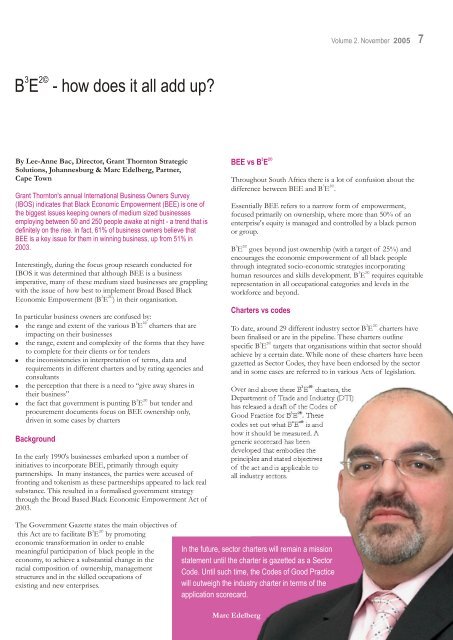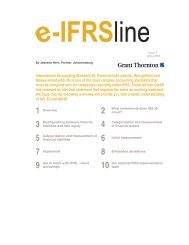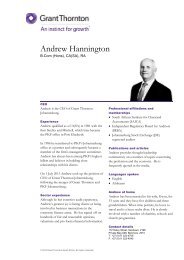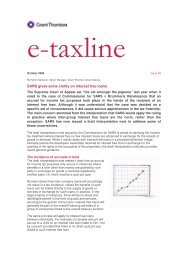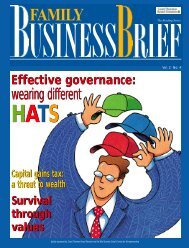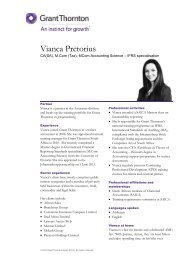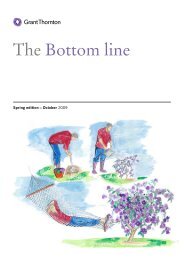IFRS - there's nowhere to hide - Grant Thornton
IFRS - there's nowhere to hide - Grant Thornton
IFRS - there's nowhere to hide - Grant Thornton
Create successful ePaper yourself
Turn your PDF publications into a flip-book with our unique Google optimized e-Paper software.
Volume 2. November 2005<br />
7<br />
3 2©<br />
B E - how does it all add up<br />
By Lee-Anne Bac, Direc<strong>to</strong>r, <strong>Grant</strong> Thorn<strong>to</strong>n Strategic<br />
Solutions, Johannesburg & Marc Edelberg, Partner,<br />
Cape Town<br />
<strong>Grant</strong> Thorn<strong>to</strong>n's annual International Business Owners Survey<br />
(IBOS) indicates that Black Economic Empowerment (BEE) is one of<br />
the biggest issues keeping owners of medium sized businesses<br />
employing between 50 and 250 people awake at night - a trend that is<br />
definitely on the rise. In fact, 61% of business owners believe that<br />
BEE is a key issue for them in winning business, up from 51% in<br />
2003.<br />
3 2©<br />
BEE vs B E<br />
Throughout South Africa there is a lot of confusion about the<br />
3 2©<br />
difference between BEE and B E .<br />
Essentially BEE refers <strong>to</strong> a narrow form of empowerment,<br />
focused primarily on ownership, where more than 50% of an<br />
enterprise's equity is managed and controlled by a black person<br />
or group.<br />
3 2©<br />
B E goes beyond just ownership (with a target of 25%) and<br />
encourages the economic empowerment of all black people<br />
through integrated socio-economic strategies incorporating<br />
3 2©<br />
human resources and skills development. B E requires equitable<br />
representation in all occupational categories and levels in the<br />
workforce and beyond.<br />
Interestingly, during the focus group research conducted for<br />
IBOS it was determined that although BEE is a business<br />
imperative, many of these medium sized businesses are grappling<br />
with the issue of how best <strong>to</strong> implement Broad Based Black<br />
3 2©<br />
Economic Empowerment (B E ) in their organisation.<br />
Charters vs codes<br />
In particular business owners are confused by:<br />
3 2©<br />
the range and extent of the various B E charters that are 3 2©<br />
To date, around 29 different industry sec<strong>to</strong>r B E charters have<br />
impacting on their businesses<br />
been finalised or are in the pipeline. These charters outline<br />
the range, extent and complexity of the forms that they have<br />
3 2©<br />
specific B E targets that organisations within that sec<strong>to</strong>r should<br />
<strong>to</strong> complete for their clients or for tenders<br />
achieve by a certain date. While none of these charters have been<br />
the inconsistencies in interpretation of terms, data and<br />
gazetted as Sec<strong>to</strong>r Codes, they have been endorsed by the sec<strong>to</strong>r<br />
requirements in different charters and by rating agencies and<br />
and in some cases are referred <strong>to</strong> in various Acts of legislation.<br />
consultants<br />
the perception that there is a need <strong>to</strong> “give away shares in<br />
3 2©<br />
Over and above these B E charters, the<br />
their business”<br />
3 2©<br />
Department of Trade and Industry (DTI)<br />
the fact that government is punting B E but tender and<br />
has released a draft of the Codes of<br />
procurement documents focus on BEE ownership only,<br />
3 2©<br />
Good Practice for B E . These<br />
driven in some cases by charters 3 2©<br />
codes set out what B E is and<br />
how it should be measured. A<br />
Background<br />
generic scorecard has been<br />
developed that embodies the<br />
In the early 1990's businesses embarked upon a number of<br />
principles and stated objectives<br />
initiatives <strong>to</strong> incorporate BEE, primarily through equity<br />
of the act and is applicable <strong>to</strong><br />
partnerships. In many instances, the parties were accused of<br />
all industry sec<strong>to</strong>rs.<br />
fronting and <strong>to</strong>kenism as these partnerships appeared <strong>to</strong> lack real<br />
substance. This resulted in a formalised government strategy<br />
through the Broad Based Black Economic Empowerment Act of<br />
2003.<br />
The Government Gazette states the main objectives of<br />
3 2©<br />
this Act are <strong>to</strong> facilitate B E by promoting<br />
economic transformation in order <strong>to</strong> enable<br />
meaningful participation of black people in the<br />
economy, <strong>to</strong> achieve a substantial change in the<br />
racial composition of ownership, management<br />
structures and in the skilled occupations of<br />
existing and new enterprises.<br />
In the future, sec<strong>to</strong>r charters will remain a mission<br />
statement until the charter is gazetted as a Sec<strong>to</strong>r<br />
Code. Until such time, the Codes of Good Practice<br />
will outweigh the industry charter in terms of the<br />
application scorecard.<br />
Marc Edelberg


